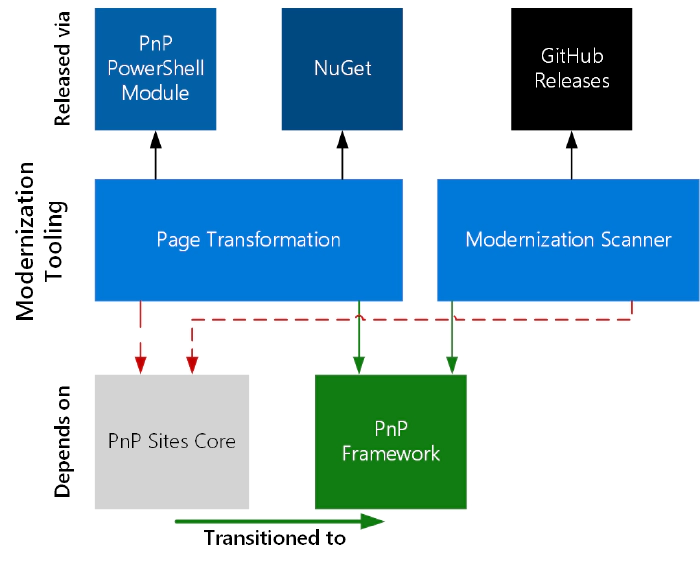Modernization lives on in PnP Framework
Using the Modernization tooling, classic SharePoint pages can be converted to Modern pages residing in Microsoft 365 Team or Communication sites.
The overall benefit of using this tooling, is that you can scan the environment to get an inventory by using the Modernization scanner (SharePoint Online only); and then with the Page Transformation tools, you then have the option to move your classic content to the modern experience - this supports either an on-premises SharePoint system or sites in SharePoint Online. The tooling is focused on the pages in classic sites and will allow you to keep and convert that content in which you have invested in resources to produce.
There is currently a major multi-step project to move away from older versions of PnP Sites Core and PnP PowerShell to taking advantage of modern .NET 5 and refocus the SDK to Graph first. For details of this project check out this blog for more details about the long term plans for the project for General Availability of the new PnP Framework library for automating SharePoint Online operations

The modernization tooling is dependent on the PnP Sites Core, we are pleased to announce this now has been ported and integrated into PnP Framework as part of the steppingstone of improvements – meaning you can continue to take advantage of this tooling, if you wish, via either new PnP.PowerShell library that contains the cmdlets required to perform page transformation or the PnP.Framework NuGet package to use in your .NET applications.
There is one caveat with the move to PnP Framework, that we have no longer support for SharePoint 2010, due to the widening gaps between Office 365 APIs and the older SharePoint 2010 APIs (which is also coming up for retirement in April 2021).
To resolve the issues, we would have to spend significant time engineering a fix and we feel that better value of time can be used to continue integrating into the newest frameworks. If you wish to use the tooling with SharePoint 2010 support then please download the older versions Alternatively, you can use a migration tool to copy the classic sites to SharePoint Online and then convert to modern.
Old GitHub Repository Location New GitHub Repository Location PnP-Sites-Core repository (archived) PnP Framework repository PnP-PowerShell repository (archived) PnP.PowerShell repository SP-Dev-Modernization repository PnP Framework repository
As PnP Sites Core and older PnP PowerShell GitHub repositories are now archived, this will mean these are no longer updated and there will be no further releases of PnP PowerShell (classic) and PnP Sites Core.
Updates to the modernization tool, specifically the page transformation tool are no longer being released as this would require a new release of the underlying archived frameworks; updates will now be released via the PnP Framework repository and as these now have builds either nightly or monthly, you will be able to take advantage of updates the next day – to use these nightly versions, you can install the prerelease version of the PowerShell modules from the gallery or grab the latest NuGet packages.
The Modernization scanner is currently being maintained for the time being in the SP-Dev-Modernization repository, as this tool is , any issues found with this tool can continue to be posted to this repository.
For bugs, enhancements with the page transformation tooling, please post to the issues list on the PnP Framework page – these will then be investigated and any bug or enhancement that is written as a outcome of the issue will be included in the nightly builds of PnP Framework.
Currently, the PnP Core SDK that will eventually replace PnP Framework is currently in beta and is currently under active development. When this is complete, the next steps are to transition all the tooling, PnP Framework, PnP PowerShell, and Modernization tooling to utilize this library -details on timelines and what features are included will be announced on a later date.